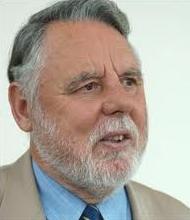 In January 1987 Terry Waite was captured in Beirut whilst he was attempting to secure the release of hostages. He was kept in solitary confinement for four years and kept hostage in total for almost five years, 1763 days in all. His story was on the front pages and TV screens around the world.
In January 1987 Terry Waite was captured in Beirut whilst he was attempting to secure the release of hostages. He was kept in solitary confinement for four years and kept hostage in total for almost five years, 1763 days in all. His story was on the front pages and TV screens around the world.
On 18 November 2016, Terry marked the 25th anniversary of his release.
It is difficult to think of anyone else whose integrity and humanity are so striking. When he speaks, Terry’s quiet authority and personal conviction shine through. This man suffered so much at the hands of others, and he now shares what he has learned from his experiences, with humour and clarity.
Terry is invited to address audiences worldwide. His audiences include business professionals, schools, universities, young people and the wider public. His honesty and straightforward manner endear him to all ages, and people are often surprised by his warm sense of humour.
Born in 1939 in Cheshire, Terry’s formative years were spent in a small village where his father was the village policeman. His primary and secondary education took place locally. He served for a brief period with the Grenadier Guards but had to retire on medical grounds. He entered the Church Army College in London in 1958 and studied theology. He then worked closely with the Church of England Board of Education and made a special study of group dynamics, leadership training, conflict resolution and inter-cultural communication patterns.
He married Helen Watters in 1964. They have three daughters and a son. He was appointed Advisor to the Bishop of Bristol, the Right Reverend Oliver Tompkins, with responsibility for both clerical and lay education.
In 1969 he moved with his family to Africa where he was Advisor to the first Archbishop of Uganda, the Most Reverend Erica Sabiti. He witnessed the Amin coup, and he and his wife narrowly escaped death on several occasions due to civil violence. The family moved to Rome in 1972 and he travelled the world advising organisations of the Roman Catholic Church on development – mainly in the fields of health and education. He travelled widely in Africa, Asia, the Caribbean and North and South America. Terry is not an ordained priest.
In 1978 the family moved to London where he continued his work with the Roman Catholic Church. In 1979 he intended to take a sabbatical year, but was asked to assist the British Council of Churches on their African desk, part-time.
In March 1980, Terry Waite was appointed by the new Archbishop of Canterbury, the Most Reverend Robert Runcie, as Advisor on Anglican Communion Affairs. He accompanied the Archbishop on journeys worldwide and was responsible for advising the Archbishop on a wide range of international issues.
During his years at Lambeth, Terry was involved with the plight of hostages, especially in Tehran, Libya and Beirut. He resigned from Lambeth Palace in April 1992 after serving on the staff for over 12 years. In the same month, he was elected a Fellow Commoner at Trinity Hall, Cambridge. He was awarded the MBE in 1982 and the CBE in 1992.
He holds honorary doctorates from the Universities of the City of London (1986), Kent at Canterbury (1986), Liverpool (1986), Durham (1992), Sussex (1992) and Yale (1992). In 1989 he was awarded the UK Templeton Award. In 1992 he received the Freedom of the London Borough of Lewisham and the Freedom of the City of Canterbury.
Terry is the Founder Chairman of Y-Care International; a trustee of the Butler Trust; Patron of Strode Park Foundation for the Disabled; Member of Council of Victim Support and an active supporter of many charitable organisations.
Terry’s books include his autobiography Taken On Trust (written during his time in captivity, in his head, as he had no pencil or paper) and Footfalls In Memory. His humorous books include Travels With A Primate (about his global adventures with the Archbishop of Canterbury) and The Voyage of the Golden Handshake, based on the cruises on which he has spoken worldwide (published 2015). His autobiography was re-released in a Classic edition in November 2016.
In February 2004, Terry returned to Lebanon. It was his first trip back there after his captivity.
One of Terry’s key messages is “no regrets” and he had always said he would not return unless there was a truly positive reason to do so. 2004 was the 20th anniversary of the charity he set up – called Y-Care – which works to help young people. Terry had been invited to give a lecture in March 2004 on the subject of “Children in Conflict”, so he travelled to the Middle East to look at projects in Lebanon, East Jerusalem and Gaza and to meet the children first-hand. This visit received major international news coverage and wide acclaim.
